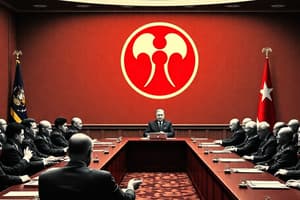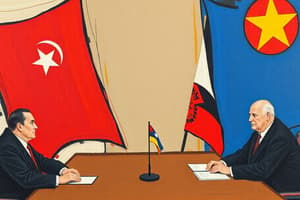Podcast
Questions and Answers
What event marked the beginning of a prolonged conflict involving the Soviet Union in 1979?
What event marked the beginning of a prolonged conflict involving the Soviet Union in 1979?
- The Soviet invasion of Afghanistan (correct)
- The Cuban Missile Crisis
- The Gulf of Tonkin Resolution
- The signing of the SALT I Treaty
Which treaty was established in 1963 to limit nuclear testing between the US and USSR?
Which treaty was established in 1963 to limit nuclear testing between the US and USSR?
- Partial Test Ban Treaty (correct)
- SALT I Treaty
- Prague Spring Accord
- Nuclear Non-Proliferation Treaty
The fall of the Berlin Wall in 1989 symbolized what major shift in Eastern Europe?
The fall of the Berlin Wall in 1989 symbolized what major shift in Eastern Europe?
- The rise of communist power
- The establishment of NATO
- The start of World War II
- The decline of communist power (correct)
Which US President adopted a hardline stance against the Soviet Union after his election in 1981?
Which US President adopted a hardline stance against the Soviet Union after his election in 1981?
What significant event in 1962 brought the United States and the Soviet Union to the edge of nuclear conflict?
What significant event in 1962 brought the United States and the Soviet Union to the edge of nuclear conflict?
What was the primary purpose of the Truman Doctrine established in 1947?
What was the primary purpose of the Truman Doctrine established in 1947?
Which event marked the beginning of the Space Race?
Which event marked the beginning of the Space Race?
What was a significant outcome of the Potsdam Conference in 1945?
What was a significant outcome of the Potsdam Conference in 1945?
Which military alliance was formed in response to NATO in 1955?
Which military alliance was formed in response to NATO in 1955?
What event led to the Berlin Airlift in 1948?
What event led to the Berlin Airlift in 1948?
Flashcards are hidden until you start studying
Study Notes
The Origins and Early Years (1945-1950)
- Potsdam Conference (1945): Allied leaders Truman, Stalin, and Churchill/Attlee delineate occupation zones in Germany and Berlin.
- Formation of the United Nations: Established to facilitate international cooperation and prevent future conflicts.
- Iron Curtain Speech (1946): Winston Churchill articulates the geopolitical division of Europe into Eastern and Western blocs.
- Truman Doctrine (1947): President Truman pledges US support for countries resisting communist expansion, marking a commitment to containment.
- Marshall Plan (1947): Initiates significant economic aid aimed at rebuilding Western European economies post-WWII.
- Berlin Blockade (1948): Soviet blockade restricts access to West Berlin, triggering the Berlin Airlift by Western Allies to supply the city.
- Formation of NATO (1948): North Atlantic Treaty Organization established to provide collective security against Soviet threats.
- Soviet Atomic Bomb (1949): USSR detonates its first atomic bomb, ending US nuclear monopoly and intensifying the arms race.
- People's Republic of China (1949): Mao Zedong's victory in the Chinese Civil War leads to communist rule in China.
The Early Cold War (1950-1960)
- Korean War (1950): North Korea's invasion of South Korea prompts a UN-led military intervention.
- Hydrogen Bomb Development (1952): Both US and USSR create hydrogen bombs, significantly escalating nuclear armament.
- Warsaw Pact (1955): Military alliance formed by USSR and Eastern bloc nations in response to NATO.
- Austrian Independence (1955): Austria becomes a neutral buffer state between East and West following the end of occupation.
- Hungarian Uprising (1956): A failed anti-communist revolt is violently suppressed by Soviet forces.
- Suez Crisis (1956): Military action by Israel, France, and the UK against Egypt causes a major geopolitical crisis.
- Sputnik Launch (1957): USSR launches the first artificial satellite, igniting the Space Race.
- U-2 Incident (1958): US spy plane shot down over Soviet territory heightens Cold War tensions.
The Cuban Missile Crisis and Détente (1960-1970)
- Bay of Pigs Invasion (1961): US fails in a covert operation to overthrow Fidel Castro's Cuban government.
- Berlin Wall Construction (1961): Erected to prevent East Germans from emigrating to West Berlin, symbolizing Cold War divisions.
- Cuban Missile Crisis (1962): Near nuclear confrontation occurs as US discovers Soviet missile installations in Cuba, drawing intense global scrutiny.
- Partial Test Ban Treaty (1963): Agreement to ban nuclear tests in the atmosphere, underwater, and in space.
- Gulf of Tonkin Resolution (1964): Congress authorizes President Johnson to escalate US military involvement in Vietnam.
- Prague Spring (1968): A period of political liberalization in Czechoslovakia is crushed by Soviet intervention.
- SALT I Treaty (1972): First agreement between US and USSR to limit strategic nuclear weapons.
The Late Cold War and Collapse (1970-1991)
- Soviet Invasion of Afghanistan (1979): Initiates a lengthy and costly conflict for the USSR, straining its resources.
- Iran Hostage Crisis (1980): 52 American diplomats and citizens held hostage for 444 days, affecting US-Iran relations.
- Ronald Reagan Elected (1981): Adopts a confrontational policy toward the Soviet Union, intensifying the Cold War rhetoric.
- Mikhail Gorbachev (1985): Becomes Soviet leader and introduces reforms of perestroika (restructuring) and glasnost (openness).
- Fall of the Berlin Wall (1989): Marks the symbolic end of communism in Eastern Europe and the easing of Cold War tensions.
- Tiananmen Square Protests (1989): Chinese government violently suppresses pro-democracy protests, drawing international condemnation.
- Collapse of the Soviet Union (1991): Dissolution into independent states signifies the definitive conclusion of the Cold War.
Key Players
- United States Leaders: Harry S. Truman, Dwight D. Eisenhower, John F. Kennedy, Lyndon B. Johnson, Richard Nixon, Ronald Reagan.
- Soviet Leaders: Joseph Stalin, Nikita Khrushchev, Leonid Brezhnev, Mikhail Gorbachev.
- Other Notable Figures: Winston Churchill, Mao Zedong, Fidel Castro, Margaret Thatcher.
Studying That Suits You
Use AI to generate personalized quizzes and flashcards to suit your learning preferences.




